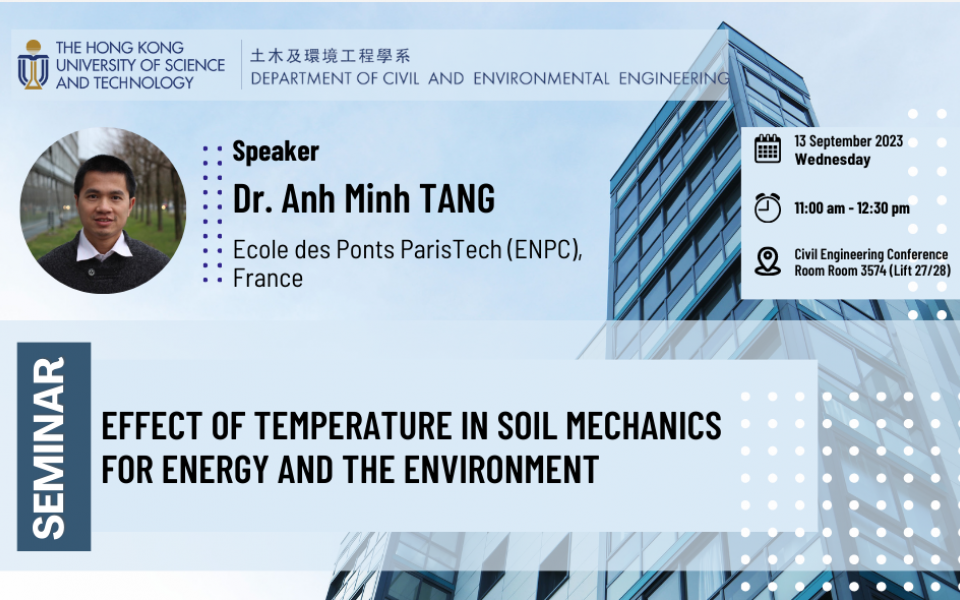Civil Engineering Departmental Seminar - Effect of temperature in soil mechanics for energy and the environment
Supporting the below United Nations Sustainable Development Goals:支持以下聯合國可持續發展目標:支持以下联合国可持续发展目标:
Effect of temperature in soil mechanics for energy and the environment
Geotechnical engineering may play an important role in responding to global climate change by reducing emissions of greenhouse gases into the atmosphere (Mitigation) and adapting to life in changing climate (Adaptation). In this seminar, Dr. Tang will present his research works related to the effect of temperature on soil mechanical behaviour in order to develop geostructures for energy and to increase the resilience of geostructures. Four examples, covering a wide range of temperature, will be analysed. First, in the concept of geological high-level radioactive waste disposal, soil surrounding the waste canisters may be heated from the initial state (around 10 °C) up to approximately 80 °C. This heating would modify the stress state in soil by increasing pore water pressure and altering soil mechanical properties. Second, in the case of energy geostructures (foundations or buried geotechnical structures which have been equipped with heat transfer pipes so that they may act as ground heat exchanger, part of a ground source heat pump system for heating or cooling of residential, commercial and industrial buildings), soil surrounding geostructures may be cooled down to few °C in winter (for heating demand of the buildings) and heated up to 30 °C in summer (for cooling demand of the buildings). In these conditions, the effect of temperature on soil mechanical properties would be negligible but soil/structure interactions related to thermal dilation/contraction of the structure would be significant. Third, natural gas hydrates abundantly exist within sediment layers along the world’s continental margins (few °C above zero), and within and beneath Arctic permafrost (few °C below zero). Any small change in temperature (due to global warming) would cause this ice-like solid to abruptly separate into water and gas and significantly modify the mechanical properties of the sediment layers. Fourth, for road pavement subgrade in cold region, freeze-thaw cycles related to seasonal change in temperature (variation around 0 °C) can induce degradation by formation of ice lenses related to cryo-suction.
Dr. Anh Minh Tang is a Research Director at Ecole des Ponts ParisTech (ENPC). He graduated from National University of Civil Engineering (Vietnam) in 2001 and completed his PhD thesis in geotechnics in 2005 at ENPC. His Habilitation (HDR, accreditation to supervise research), completed in 2012 at University of Paris-Est (France), was on the soils behaviour under coupled thermo-hydro-mechanical loading and its applications in the field of energy and the environment. His research interests include unsaturated soils, geological storage of radioactive waste, soil-atmosphere interaction, geothermal energy, transportation geotechnics, and gas hydrate-bearing sediments. Minh was principal investigator on two projects funded by the French National Research Agency, one on geotechnical aspects of heat-exchanger piles and one on gas hydrate-bearing sediments. He led the Working Group 3 (climate-vegetation-soil interactions) of the European COST Action TU1202 (Impact of climate change on engineered slopes for infrastructure). He has published more than 150 peer-reviewed journal papers. Minh serves as Editorial board Member of several reputable journals in the domain of Geological and Geotechnical Engineering. More than 20 PhD theses have been completed under his co-supervision. He also teaches soil mechanics and design of geotechnical structures to undergraduate and postgraduate students.
